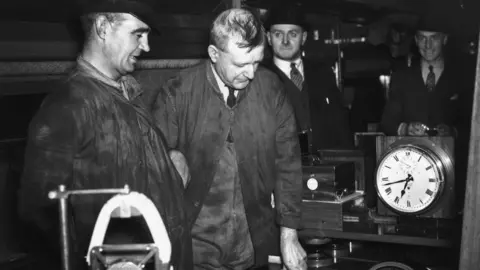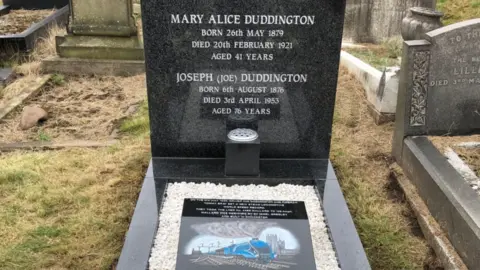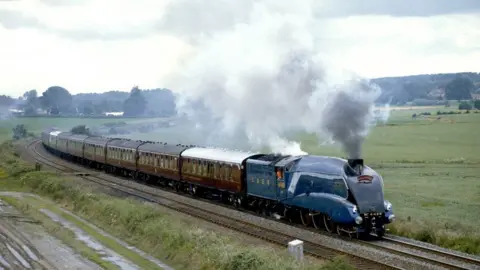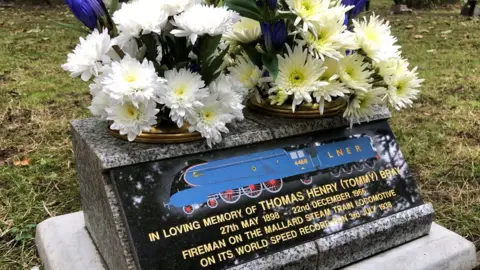Mallard locomotive driver headstone unveiled in Doncaster
 Fox Photos/Getty Images
Fox Photos/Getty ImagesA headstone for the driver of the historic Mallard locomotive has been unveiled at a Doncaster cemetery.
Thousands of pounds was raised to mark the grave of Joseph Duddington who set the world steam record with the Doncaster-built Mallard.
Mallard hit 126mph (203km/h) in 1938, with Joseph Duddington as driver and Tommy Bray as fireman.
A headstone and memorial bench have been created to mark the "phenomenal feat".
Mr Duddington, buried in an unmarked grave in Doncaster's Hyde Park cemetery, was born in the town in 1876 and died in 1953.
His great grandson Matthew Delaney said he was overwhelmed that 50 people attended the service, and he "really appreciated" that Friends of Hyde Park Cemetery crowdfunded thousands for the headstone.
Mr Delaney said his great-grandfather was the "astronaut of his day" and his feat, along with fireman Mr Bray, had been "phenomenal".

Tom Ingall, BBC News
Joe Duddington and Tommy Bray were humble men, handpicked by their company to become record breakers.
Success brought fame but no fortune.
Both were laid to rest and forgotten; the shadow of their charge 'Mallard' fell over them, and it was the machine not the men which passed into legend.
Today, history's omission has been put right. Finally Doncaster has somewhere to remember both of them.
Quite right too, as I think it's extremely unlikely what they achieved will ever be beaten.


Facts about Mallard
 Construction Photography/Avalon via Getty Images
Construction Photography/Avalon via Getty Images- Sir Nigel Gresley designed Mallard 4468 and it was built in March 1938
- Mallard was built at LNER's Doncaster works
- The A4 class locomotive broke the record when it travelled at 126mph (203km/h) on 3 July 1938 at Stoke Bank, south of Grantham
- The locomotive's introduction cut journey times from London King's Cross to Newcastle to four hours
- Mallard is now on display at the National Railway Museum in York
Source: National Railway Museum

Tommy Bray, whose ashes were interred at Rose Hill Crematorium in Doncaster, also has a new headstone as his resting place was lost.


Follow BBC Yorkshire on Facebook, Twitter and Instagram. Send your story ideas to [email protected].
